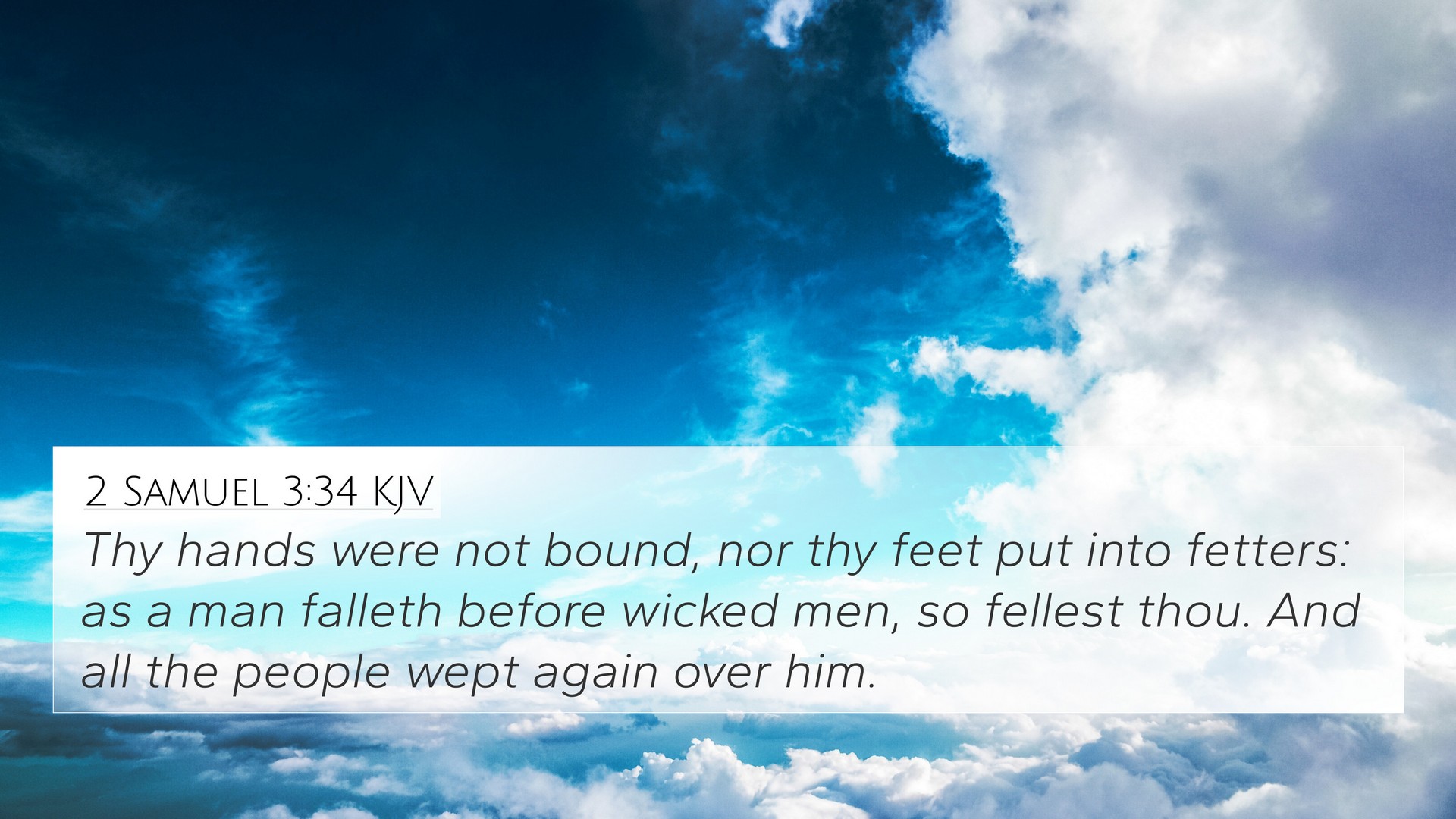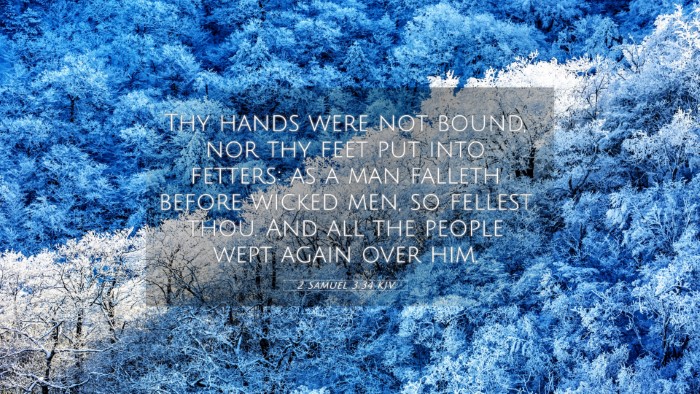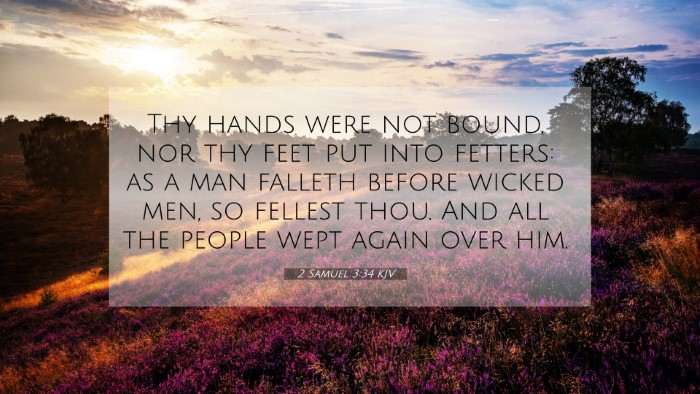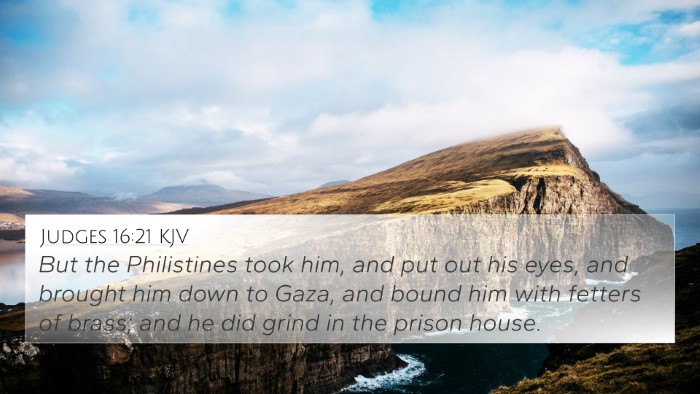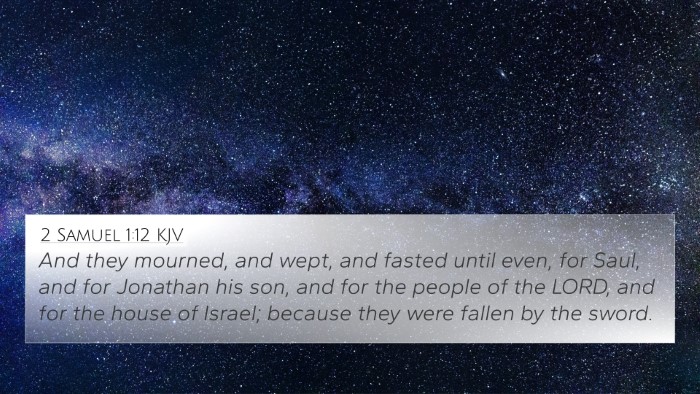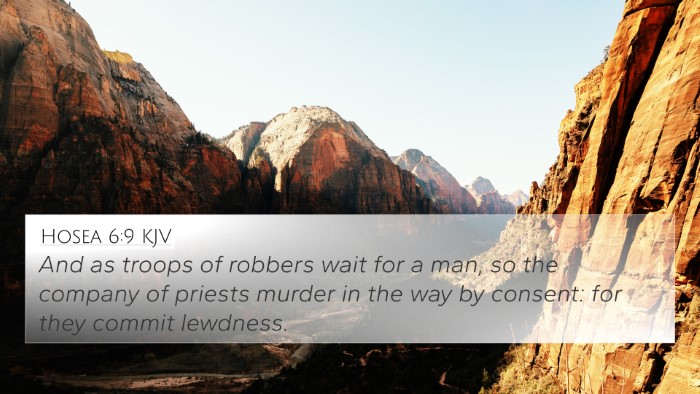Understanding 2 Samuel 3:34
Verse: "Thy hands were not bound, nor thy feet put into fetters: as a man falleth before wicked men, so fellest thou." This verse recounts the death of Abner, highlighting not only the manner of his passing but also the injustice surrounding it.
Summary of 2 Samuel 3:34
This verse captures the tragic end of Abner, the commander of Saul’s army, who was killed by Joab. The imagery used draws a stark contrast between the dignity of Abner as he fell—unbound and unshackled—and the treachery of his assassination. By noting that he fell like a man before wicked individuals, it underscores the themes of betrayal and the sometimes unforeseen nature of violence in human affairs.
Commentary Insights
Matthew Henry's Commentary
Henry emphasizes the idea of Abner's death being a deliberate and treacherous act by Joab. He notes that Abner was not in a state of bondage, symbolizing the freedom he had, yet this freedom did not protect him from the malice of men. This highlights the unpredictable nature of human relationships and the gravity of betrayal.
Albert Barnes' Notes
Barnes mentions that the description of Abner's death serves to emphasize the unarmed nature of the victim. The phrase "as a man falleth before wicked men" illustrates the suddenness and cruelty of his demise. The choice of words indicates not just physical defeat but a moral and ethical collapse, leading to the reflection on justice and the consequences of violence.
Adam Clarke's Commentary
Clarke points to the sociopolitical implications of Abner's death. He notes that Abner had key alliances that could have led to peace, and thus his assassination represented a significant blow to potential unification in Israel. Clarke also reflects on the symbolic overtones of falling before wicked men, as it suggests a greater moral decay in the leaders of Israel.
Thematic Connections
- Betrayal and Violence: The themes prevalent in 2 Samuel 3:34 echo throughout Scripture, particularly in narratives involving betrayal, such as in the story of Judas Iscariot (Matthew 26:14-16).
- Justice and Injustice: The unjust death of Abner invites a reflection on judicial systems noted in Proverbs 17:15, which states, "He who justifies the wicked and he who condemns the righteous are both alike an abomination to the Lord."
- Moral Integrity: The contrast between a life of integrity and a death of treachery reinforces concepts seen in Proverbs 10:9, "Whoever walks in integrity walks securely, but he who makes his ways crooked will be found out."
- Divine Sovereignty and Human Free Will: The tension between divine purpose and human actions can be connected with Genesis 50:20, where Joseph states that what men meant for evil, God meant for good.
- Leadership and Responsibility: The failures of leaders from this narrative parallel the admonitions in James 3:1 regarding the weight of responsibility held by teachers and leaders in faith communities.
- Peace and Conflict: Abner's role as a potential unifier reflects the broader biblical narrative of God's desire for peace among His people, as seen in Micah 4:3.
- Power Struggles: The strife over leadership and authority encapsulated in this verse can be examined in the light of 1 Timothy 6:9-10 which warns against the love of money and its consequences in conflicts.
Cross-References
2 Samuel 3:34 connects with several other passages that reveal deeper meanings and parallels in the Scriptures:
- Matthew 5:38-39: "You have heard that it was said, ‘An eye for an eye and a tooth for a tooth.’ But I say to you, Do not resist the one who is evil."
- Psalm 55:21: "The words of his mouth were smoother than butter, but war was in his heart; his words were softer than oil, yet they were drawn swords."
- Ecclesiastes 8:11: "Because the sentence against an evil deed is not executed speedily, the heart of the children of man is fully set to do evil."
- James 4:1-2: "What causes quarrels and what causes fights among you? Is it not this, that your passions are at war within you?"
- Job 15:20-21: "The wicked man writhes in pain all his days, through all the years that are laid up for the ruthless. Dreadful sounds are in his ears; in prosperity, the destroyer will come upon him."
- Luke 22:48: "But Jesus said to him, 'Judas, would you betray the Son of Man with a kiss?'
- Proverbs 28:5: "Evil men do not understand justice, but those who seek the Lord understand it completely."
Conclusion
In essence, 2 Samuel 3:34 stands as a poignant reminder of the complexities of human interaction and the often devastating consequences of betrayal and violence. Different biblical commentators shed light on various aspects, including the moral implications of leadership and the inevitable intersection of divine sovereignty with human choices. This verse can be studied in conjunction with numerous others to unravel rich theological and ethical dialogues within the biblical canon.
Tools for Further Study
For those interested in deeper study, consider utilizing:
- A Bible concordance to explore related texts.
- A cross-reference Bible study guide to identify connecting verses.
- Resources that provide a Bible cross-reference system for thematic studies and sermon preparation.
- Comprehensive materials for inter-Biblical dialogue and comparative studies across different scripture passages.
